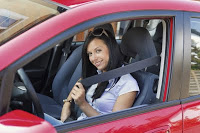Category Archive: Parents

Teen Driving Fatalities During After School Hours
October 31, 2006
Listen up, parents. If you were worried about teenagers driving on the weekend nights with their friends, you’ll have new reasons to monitor teen driving after reading a recent press release by AAA. According to new research, teens are just about as likely to get into fatal accidents while driving during after school hours.
Teen drivers had 1,237 fatal accidents between 2002 and 2005 when driving on Friday and Saturday nights. But, what’s surprising is that there were almost just as many fatal accidents for weekdays between 3 and 5 p.m. – 1,100 in total. That means they’re not much safer being limited to driving to and from school each day.
What can you do to help your teen driver avoid a fatal accident? Here are a few suggestions giving by AAA that may help save your teens life.
- While most states have laws that limit the number of passengers a new teen driver may have, make sure this law is a family rule. The more passengers a new driver has, the more likely they are to be involved in an accident.
- Keep your teen from using the cell phone while driving, even the hands-free type. Even an experienced adult driver has trouble driving while talking on the phone.
- Make sure your teen uses their seatbelt each time they ride in the car. Though teens feel invincible, we certainly are not. Teens have the highest crash rates, but yet the lowest rates of seatbelt usage.
- Finally, make sure other adults in the family know the ground rules set. Tell the parents of your teen’s friends, or even your neighbors. If everyone keeps an eye on your teen’s driving habits, they are less likely to bend the rules and put themselves at a greater risk of a fatal accident.
If there are laws in your state limiting the hours your teen may drive, or the number of passengers they may carry while they are new to driving, you may feel your teen is much safer than others are. However, laws are still broken, so always monitor your teens driving and keep the ground rules firm. For more information, read the Department of Highway Safety and Motor Vehicles Driver Education Handbook for Parents.

Are You a Road Ready Teen?
October 16, 2006
Most teens have heard from their parents that driving is a big responsibility and that we have to earn it. This comes with a lot of eye rolling on our parts and impatience at getting those car keys in our hand. Well, the fact of the matter is, our parents have a point. Fatal car accidents are the number one killer for teenagers and other young drivers under 25 years of age.
As teenagers, it is important to ask ourselves what have we as done exactly to earn the driving privilege we feel we are owed? Are we paying the gas, insurance, and car payment that enable us to drive? Most teens are not doing any of those things. We perhaps will automatically assume that we will get driving privileges the moment we get our driver’s permit.
For us teenagers, a sure-fire way to prove that we can handle the responsibility of driving is by taking the “Road Ready Teens” driving program that is presented by DaimlerChrysler. Let’s face it – teens as a whole are not proving to the adults that they are ready for the road. Young drivers are inexperienced and have a high rate of fatal car crashes.
This program has a number of aspects that are actually quite interesting and informative. As teens, we can learn many things to help us become better drivers, keep the roads safe and our parents happy.
There are a few driving schools that offer this type of program, but this video game is the first of its kind. It will simulate road risks you may encounter, and test you to figure out how you would handle your car. For instance, it may simulate a blown tire to see if your first reaction is to swerve (not good), or to calmly guide your vehicle to the side of the road.
Trust me; you don’t want to learn these driving tips by experience, so playing the video game is a good idea. You can even email your friends and issue challenges to try to beat your score, which puts the fun back into learning to drive.
Teen Drivers at a Serious Risk: Some Statistics
October 9, 2006
We all know that fatal accidents involving teenage drivers is becoming a problem, but do we know exactly how much of a problem? It’s easy to ignore statistics, especially when we don’t know each individual that became a part of that statistic.
When fatal accidents happen in our community, and when we start attending the funerals of teenagers that we went to school with, then we start to see the problem. We should not be waiting until someone we know is killed to pay attention to the risk we teenage drivers pose to ourselves.
We could be the next statistic if we don’t pay attention NOW.
Here are some startling statistics offered by the National Highway Traffic Safety Administration, or NHTSA. Remember, each of these numbers could have been someone you know: a close friend, classmate, sister, or brother.
- More than 68,000 teenagers have died in car accidents in the last ten years. Even scarier is that two thirds of those killed were teenage boys.
- In America, car accidents are the leading cause of death for teenagers. It seems so senseless, considering that a fatal accident is more easily prevented than cancer, suicide, murder, and other ways we teenagers can die.
- The fatality rate for teenage drivers is about four times higher than the rate for drivers that are 25 years and older. This is the reason it is clearly a matter of experience when it comes to the problem of fatal teenage accidents. Inexperienced drivers are at a higher risk.
- In 2001, almost 7,600 teenagers were involved in a fatal crash, 5,300 of those were killed, and two thirds of those killed were not wearing their seatbelt. If it’s not the law in your state to wear a safety belt, do it anyway!
- Finally, a staggering 65% of teenage passengers killed in car crashes, died while another teenager was driving.
One thing is clear: if you are a teenage driver, you are at a high risk of killing yourself, or someone you know, each time you get behind the wheel. Take the time to learn your vehicle, the rules of the road, and avoid carrying passengers until you can be sure you and your friends won’t become one of the statistics listed above.

Car Accident Kills Teen
October 3, 2006
Jeffrey Lee, 15, of Pleasant Grove, Alabama, died September 24 when he was pinned under a relative’s car. Lee apparently put the car in gear, jumped out and was then run over.
Source: Al.com
Safe Driving Lesson Learned
Getting ready to drive is as much a part of motor vehicle safety as actually driving. From the time you enter your vehicle, you are dealing with a potentially deadly machine. Caution must be exercised around the vehicle at all times. Never exit the vehicle without putting it in the proper gear, turning off the ignition, and, if necessary, setting the parking brake.
Before you start your engine:
- Make sure all windows are clean. Remove anything that blocks your view of the road.
- Adjust the seat so you can reach all controls.
- Adjust the inside and outside rearview mirrors. You should not have to lean forward or backward to use them.
- Lock all car doors.
- Put on your safety belts. Ask all passengers to do the same.
- Make sure your car is in park or neutral gear before starting the engine.
Never move your car until you have looked in front, behind and to the side for pedestrians and oncoming traffic. Then, signal and pull into traffic when safe.
Good drivers develop habits that focus their full attention on driving. Some drivers can develop bad habits that can be very dangerous when driving. Some bad habits that distract your attention away from driving are:
- Driving when ill, upset or angry.
- Driving while eating and drinking.
- Driving while adjusting the radio or changing CDs/tapes.
- Driving while calling, answering or talking on a mobile phone.
- Reading while driving.
- Driving while drowsy or fatigued.
Good driving is based on practice and being alert at the wheel from the time you enter the vehicle until you exit.
This post is an excerpt from a recent edition of the Safe Driving Teen Monthly Bulletin. Each month the National Safety Commission publishes the bulletin for teens and parents designed to improve teen driver behavior, attitude, skills, and experience. Subscription Details

Exercising Parental Control Can Lead to Fewer Teen Driving Crashes
September 22, 2006
Sometimes it can be tough being a teenager. You have all these expectations heaped on you – get good grades, be responsible, mind your parents… But what if your parents are not exercising any control over your behavior? Results from the latest Teens Today study show that driving accidents are way down in the teenage category as compared to twenty-five years ago. That sounds great on the surface but the reality of it is that those teenagers who are causing the crashes are not being governed adequately by their parents.
These crash-causing teens are practicing reckless behavior like driving while drunk or under the influence of drugs. Others are being just plain careless by not practicing safe driving conduct. Ask any teenager who drives and acts responsibly why they have not been in an accident. The answer is their parents impose consequences for their negative actions and behavior. It is as simple as that! They screw up whether it is a scratch on the bumper or a speeding ticket and chances are that the parents will take their car keys away for a period of time. What better way for us to learn than by cutting off our source of independence!
We all grumble about our parents from time to time. But let’s face it – some of them just aren’t as involved in our lives as they should be. We all have heard that old saying about kids wanting discipline. Well, in this case, while teenagers may not say they want it, they need it to stay on the straight and narrow. Parents – we should not have to learn the hard way about drinking and driving or bad driving practices like sending text messages or eating while driving.
Teenagers should be learning by the example their parents set. What’s even worse about this whole thing is that sometimes, parents are in the car when their kids are displaying that bad behavior like speeding, talking on the cell phone or fiddling with the CD player. The parents should make their kid pull over because they were not practicing safe driving behavior. Instead, many of them just let it go, teaching those teenagers that it is ok to continue those destructive behaviors.
Come on bad teenage drivers! You are giving the rest of us a bad name. Clean up your act and treat driving a car like the privilege that it is. And that is exactly what driving should be to a teenager – a privilege. Listen up parents! Be the grownup and take away the car keys if you have to … it is definitely better to have a mad teenager than a dead one.
